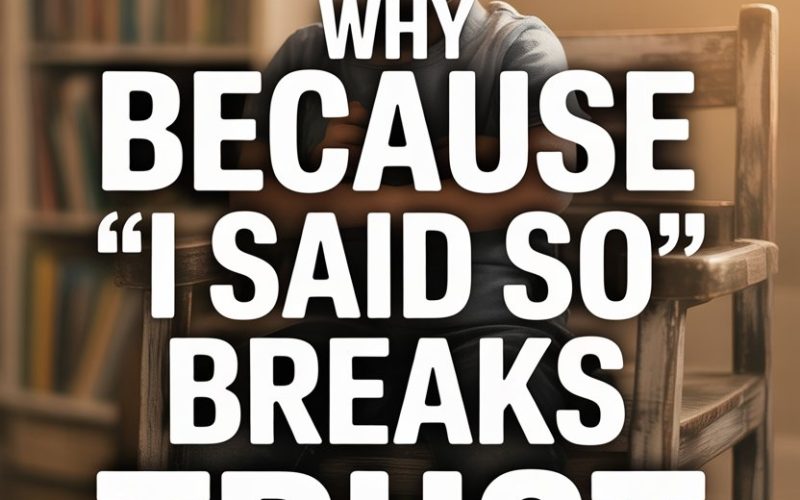Ever told your child, “Because I said so,” and instantly regretted it? You’re definitely not alone.
That phrase is as much a staple of parenting as mismatched socks or forgotten library books. It seems efficient—until the look on your child’s face reminds you there might be a better way.
Let’s unpack why this classic comeback might be doing more harm than good, and what you can try instead.
The Hidden Cost of ‘Because I Said So’
It feels powerful, doesn’t it? Four little words, and you’re the boss.
But what’s really happening on the other side? Your child hears, “My opinion doesn’t matter.”
Over time, that message chips away at trust—one eye roll at a time.
A study from the Michigan State University found that children whose parents relied heavily on authoritarian phrases (like our old favorite) were less likely to confide in them as they grew older.
Why? Because trust is a two-way street, even if one of you is wearing dinosaur pajamas.
When we lean on authority for authority’s sake, we miss the chance to show our kids that we respect their curiosity—and their intelligence.
And let’s face it: nothing shuts down a budding conversation faster than, “Because I said so.”
The Power Struggle Nobody Wins
We’ve all been there. You’re running late, the toast is burning, and your child is negotiating like a tiny barrister: “But why can’t I wear my superhero cape to school?”
Your patience is thinner than your mobile screen protector. Out comes the phrase.
Unfortunately, shutting down the conversation often backfires. Kids are wired to seek understanding.
When their questions get squashed, resentment bubbles up, and that compliance you craved gets replaced with resistance—or creative, sneaky workarounds.
This isn’t just anecdotal. Research published in Child Development points out that children respond better to boundaries when they understand the reasoning behind them.
They’re more likely to cooperate, less likely to push back, and—bonus—less likely to hatch escape plans from their bedrooms at bedtime.
Short-Term Peace, Long-Term Fallout
“Because I said so” might solve a problem in the moment, especially when you’re juggling a conference call and a toddler meltdown. But what about next time?
Each use teaches your child not to ask questions. Or worse: that you’re not a safe person to ask.
As they get older, you might find yourself longing for those endless “but why?” conversations.
The magic isn’t just in answering the question—it’s in showing your child their thoughts are worth your time.
That connection builds trust, and trust builds cooperation (and possibly fewer mysterious holes in the living room wall).
What’s Really Going On When Kids Ask ‘Why?’
Kids aren’t born with an urge to be annoying, promise. Curiosity is their way of learning how the world works—and, crucially, figuring out if you’re a reliable tour guide.
When they ask “why,” children are looking for reassurance, information, and sometimes a bit of control in a world that seems determined to buckle their seatbelts for them.
According to research from Collaboratory on School and Child Health, answering “why” shows respect for your child’s growing autonomy and supports healthy brain development.
Even a brief explanation (“Because the road is icy and I want you to stay safe”) can go a long way toward soothing those little worries.
Building Trust Without a TED Talk
You don’t need a whiteboard and a laser pointer to explain every parenting decision. Sometimes, you just need a sentence that gives your child the gist and lets them feel heard.
Try these approaches during your next round of negotiations:
- “We’re leaving the playground because it’s nearly dinnertime, and we all need our energy.”
- “You need to wear a jacket because it’s chilly and I don’t want you to catch a cold.”
- “Screen time’s done for today so your brain gets a break before bed.”
You’re not inviting a debate, just giving a reason. This tiny courtesy turns you from dictator to trusted guide—no PowerPoint slides required.
When You Don’t Have Time (or Patience) for a Full Explanation
Parents are busy. The mental load is real. If your child’s “why” comes when you’re elbow-deep in laundry or mediating a sibling squabble, try a quick version:
- “I’ll explain more in a minute, but right now I need you to listen.”
- “This is important to me. I’ll tell you why after we get in the car.”
Promise—and deliver—a real answer later.
Kids can be remarkably forgiving if they know you care about their questions (and that you’ll circle back).
What to Try Tonight Instead
Tossing “because I said so” in the bin doesn’t mean letting go of boundaries. Children need limits, just as surely as they need snacks.
What changes is how you communicate those limits.
Start with empathy. “I know you really want to keep playing. Leaving the park is tough, isn’t it?” Then give your reason: “We have to go now so we’re not late for football.” Sometimes, that’s enough.
If you sense pushback brewing, try offering a choice. “Would you like to put your boots on yourself, or shall I help?” It’s a small dose of control, and it can work wonders.
Get in the habit of asking questions, too. “Why do you think we have to wash our hands before tea?” invites your child into the decision-making process and builds a habit of critical thinking.
When ‘Because I Said So’ Slips Out Anyway
Nobody’s perfect. If you catch yourself defaulting to the old standby, don’t panic.
Pause, take a deep breath, and try again: “Wait, that wasn’t very helpful. What I meant is, I want you to put your shoes on so we’re not late.”
Mistakes are part of parenting—right up there with forgotten PE kits and the mystery of missing left socks.
Repairing trust can be as simple as acknowledging you could have handled it better.
What About Safety Issues?
Sometimes, there’s no time for diplomacy. If your child is about to dart into a busy road or touch something hot, “Because I said so” might be the only option.
Survival beats Socratic dialogue every time.
Still, even after the danger has passed, circle back with an explanation. “I shouted because I was scared you’d get hurt. Next time, let’s hold hands by the kerb.” You’re showing care, not just control.
When Your Kid Just Won’t Accept Your Reason
Some children treat every boundary like an invitation to the High Court. That’s their job, developmentally speaking. Yours is to stay calm and consistent.
If you’ve given a fair reason and your child still protests, it’s okay to acknowledge their disappointment. “I hear you’re upset. It’s hard when things don’t go the way you want.”
Then, stand your ground—no need to relitigate the bedtime snack debate for the fourth time.
Modeling respectful disagreement teaches your child they can express feelings without expecting every boundary to vanish.
Long-Term Trust Pays Off
Building trust is a marathon, not a sprint. Children who feel respected and heard are more likely to come to you with their questions, worries, and—when they’re older—their mistakes.
Research from the University of Cambridge shows that secure parent-child attachments foster better mental health, stronger social skills, and greater resilience when life throws curveballs (or, as my nan would say, when the wheels come off the pram).
This doesn’t mean you’ll never hear “Why can’t I have ice cream for breakfast?” again.
It does mean that over time, your child will learn to trust your judgment—even if it’s delivered with a side of vegetables.
When You Wish You Could Phone a Friend
Some days, you’ll be tempted to reach for the old standby just to get through the witching hour. Give yourself grace.
Parenting is hard, and perfection is a myth—much like finding a matching pair of socks in a child’s drawer.
If you catch yourself in a rut, try scribbling down one new phrase to swap in for “because I said so.” Stick it on the fridge.
Recruit your partner or co-parent to spot each other when the old habits creep back in.
And if all else fails? There’s always tomorrow (and a strong cup of tea).
Raising Kids Who Trust You (and Themselves)
Swapping “Because I said so” for a quick reason doesn’t just build trust with your child—it teaches them to think, to ask, and to trust themselves.
It isn’t about relinquishing authority; it’s about sharing respect.
On the wild days, remember: you’re not just getting them to put their shoes on or eat their greens.
You’re growing a relationship—and that’s worth every “But why?” you’ll ever hear.
Pass the biscuits. You’ve earned them.




